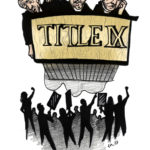EDUC DEPART. Responds to Critics who say TitleIX Draft Could Hurt Accused Students
Some commenters have noted that the department’s draft is out of step with the past year’s precedent from the 6th U.S. Circuit Court of Appeals. Its most recent decision in a campus due-process case, against the University of Michigan, not only requires colleges to allow cross-examination in sexual-misconduct cases that turn on credibility but appears to preclude them from using the single-investigator model. The draft emphasizes that the department is proposing the first binding regulations since its 1975 regulations. Previous administrations used a series of guidance documents that left all parties, from universities to advocates for survivors and accused students, in a position of “uncertainty about whether the guidance was or was not legally binding.” The draft’s confirmation that universities don’t have to offer live hearings – even though they must offer a method that “effectively substitutes” for cross-examination in non-hearing proceedings – has puzzled some lawyers and academics. The draft indeed does not explain this. All it says is that for colleges using a “non-hearing model,” each party must be allowed to submit written questions for the investigator to ask “the other party and witnesses in a manner that effectively substitutes for cross-examination.” The law firm Zalkind Duncan & Bernstein zeroed in on how these changes to hearings versus non-hearings could affect proceedings. In a Friday blog post partner Ruth O’Meara-Costello wrote, “Unfortunately, it seems very likely that colleges and universities, many of which have taken strong positions against allowing cross-examination, will respond to the rules by simply eschewing actual hearings in favor of the increasingly popular single-investigator model.” “[R]espondents may lose more than they gain from the cross-examination mandate in hearings if colleges simply drop the hearing model in response.”
Ed.Dept exchange @ College Fix By Greg Piper

